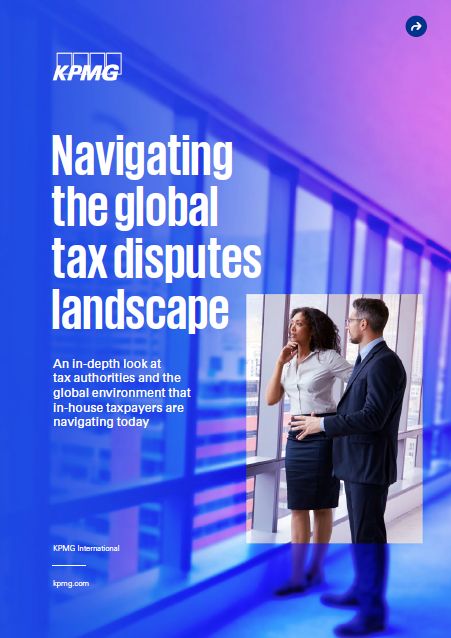The rise of tax authority activity
This special report takes an in-depth look at tax authorities worldwide and the global environment that in-house taxpayers are navigating today. Based on an extensive survey of tax dispute professionals from KPMG firms, this report examines the trends and developments shaping the current environment and how tax authorities respond. Overall, the survey results show that companies see a significant rise in tax audits and disputes, and all signs point toward even more intense tax authority activity in the future.

Navigating the global tax disputes landscape
An in-depth look at tax authorities worldwide and the global environment that in-house taxpayers are navigating today, based on a survey of over 115 tax dispute professionals from KPMG firms in 49 jurisdictions worldwide.
Download slipsheet (2 MB) ⤓
About the survey
This report charts the evolution of leading tax departments and identifies operational benchmarks for high-performing tax teams. It highlights the survey’s findings about issues facing tax authorities that include people, processes, and technology deployed by tax departments to manage their activities related to tax audits and disputes.
The findings in this report are based on a survey of over 115 tax dispute professionals from KPMG firms in 49 jurisdictions worldwide.
About 40 percent of respondents deal primarily with international companies, while 35 percent most commonly work with large domestic companies. The remaining respondents are focused on small business clients (15 percent) and individual clients (10 percent).
Key findings
Audit activity has been rising across the board for most taxes, with a special focus on multinational groups and large domestic taxpayers.
Audits are being approached more aggressively, and tax authorities seem more likely to employ harder-hitting powers to gather information, such as asserting formal access rights, conducting formal interviews and issuing summonses.
New and increased tax penalties are being enacted, and tax authorities seem to be applying them as well as existing penalties more frequently.
Technology is helping tax authorities improve the evaluation of enormous volumes of available data that can help identify and address significant compliance risks.
Disputes can be resolved through settlement in most jurisdictions, although many tax authorities tend to propose significant adjustments and expect taxpayers to concede the disputed amount.
Critical factors influencing settlement include the amount of funds at stake, the impact of the available evidence, and the risk of litigation.
Connect with us
Connect with us
- Find office locations kpmg.findOfficeLocations
- kpmg.emailUs
- Social media @ KPMG kpmg.socialMedia
Related content





